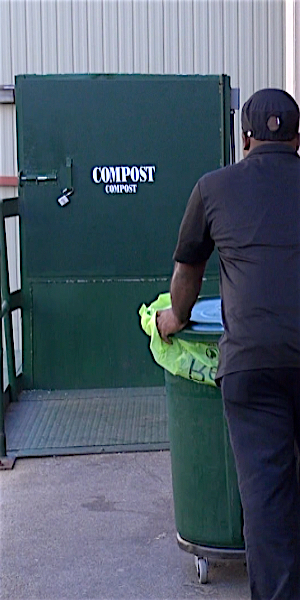We can help you take the next step!
For more than 20 years the Center for EcoTechnology (CET) has helped build the wasted food marketplace in Massachusetts. In the late 1990s, CET helped establish one of the first commercial composting infrastructure systems in the nation by bringing together haulers, compost sites, and large food establishments to start diverting wasted food. Since then CET helped create, and continues to administer, the award winning RecyclingWorks in Massachusetts program, delivered under contract to the Massachusetts Department of Environmental Protection (MassDEP).
RecyclingWorks in MA has helped thousands of businesses and institutions divert tens of thousands of tons of material from disposal. The collective work of many stakeholders has supported the growth of the food waste hauling industry, the development of compost sites and anaerobic facilities, growth in food rescue, and new technology solutions to address prevention – leading to the well-documented economic impact of $175 million in private investment, supporting over 900 jobs, and nearly tripling the tons of food diverted since 2010.
RecyclingWorks in Massachusetts is a recycling assistance program that helps Massachusetts businesses and institutions maximize recycling, reuse, and food waste diversion opportunities. This program includes direct assistance to businesses and service providers. For example, compost site operators may receive technical advice to help expand or improve operations. Businesses get help maximizing the financial, environmental, and social benefits of wasted food diversion programs, and training for staff to ensure successful program implementation. To learn more or to request assistance, contact RecyclingWorks today at (888) 254-5525 or info@RecyclingWorksMA.com — the Waste Experts are available to help you!
RecyclingWorks in MA
RecyclingWorks in Massachusetts is a recycling assistance program that helps businesses and institutions maximize recycling, reuse, and food waste diversion opportunities. Call the hotline at 888-254-5525 or email info@recyclingworksma.com to consult with a RecyclingWorks recycling expert.
RecyclingWorks in Massachusetts’ services include a searchable database to find recycling haulers and processors in your area, direct technical assistance to help you start a recycling or composting program, and compost site technical assistance for composting facilities in Massachusetts that accept or plan to accept food materials.
RecyclingWorks in Massachusetts is funded by the Massachusetts Department of Environmental Protection (MassDEP) and delivered under contract to MassDEP by the Center for EcoTechnology (CET).
The Green Team
CET administers an environmental education program for K-12 schools on behalf of MassDEP. The Green Team is an interactive educational program that empowers students and teachers to help the environment through waste reduction, recycling, composting, energy conservation, and pollution prevention.
If you are a teacher, administrator, staff member, or parent volunteer involved with a Massachusetts K-12 school, fill out the online form to register for The Green Team. Once registered, your school can request free recycling and compost bins. The Green Team website also includes resources on a range of food recovery topics such as on-site composting, share tables, and cafeteria source separation. Contact recycle@thegreenteam.org for additional information.
The Green Team is funded by the MassDEP.
Helpful Massachusetts Wasted Food Resources
- How to comply with the MassDEP commercial food waste disposal ban
- MassDEP’s compliance guide for waste haulers and businesses and institutions that dispose of one ton or more of organic material per week.
- Food recovery policy recommendations from the Massachusetts Food Policy Council
- White paper written in 2017 by the Massachusetts Food Policy Council with recommendations for state policies to increase diversion of wasted food.
- Map of sites in Massachusetts that process food scraps
- Map and list of sites, maintained by MassDEP, which accept food materials for processing, including compost sites, anaerobic digesters, de-packaging facilities, and animal feed operations.
- Food donation guidance for Massachusetts businesses
- Best management practices developed by RecyclingWorks in Massachusetts through engagement with local health officials, food rescue organizations, food banks, and organizations with established food donation programs.
- Every state has specific state-level legal and regulatory requirements regarding food waste and food donation. ReFED, a national food waste prevention nonprofit, created a searchable database of state-by-state food waste policies and regulations, in collaboration with the Harvard Food Law and Policy Clinic. View the Massachusetts food waste policy page for specific, up-to-date information about Massachusetts’s food waste laws.
- The Emerson Act
- The Federal Emerson Act (Public Law 104-210) protects donors from liability when donating to nonprofit organizations and protects donors from civil and criminal liability should the product, donated in good faith, later cause harm to the needy recipient.
- Helpful fact sheets on food donation laws from Harvard Food Law and Policy Clinic
Toolbox
For more information regarding food waste estimates, source separation guidance, and how to start a food donation program, open CET’s Toolbox.
TAKE THE NEXT STEP, CONTACT US!
Contact CET to learn more about food recovery and waste diversion opportunities for your business, institution, customers, or association members:
